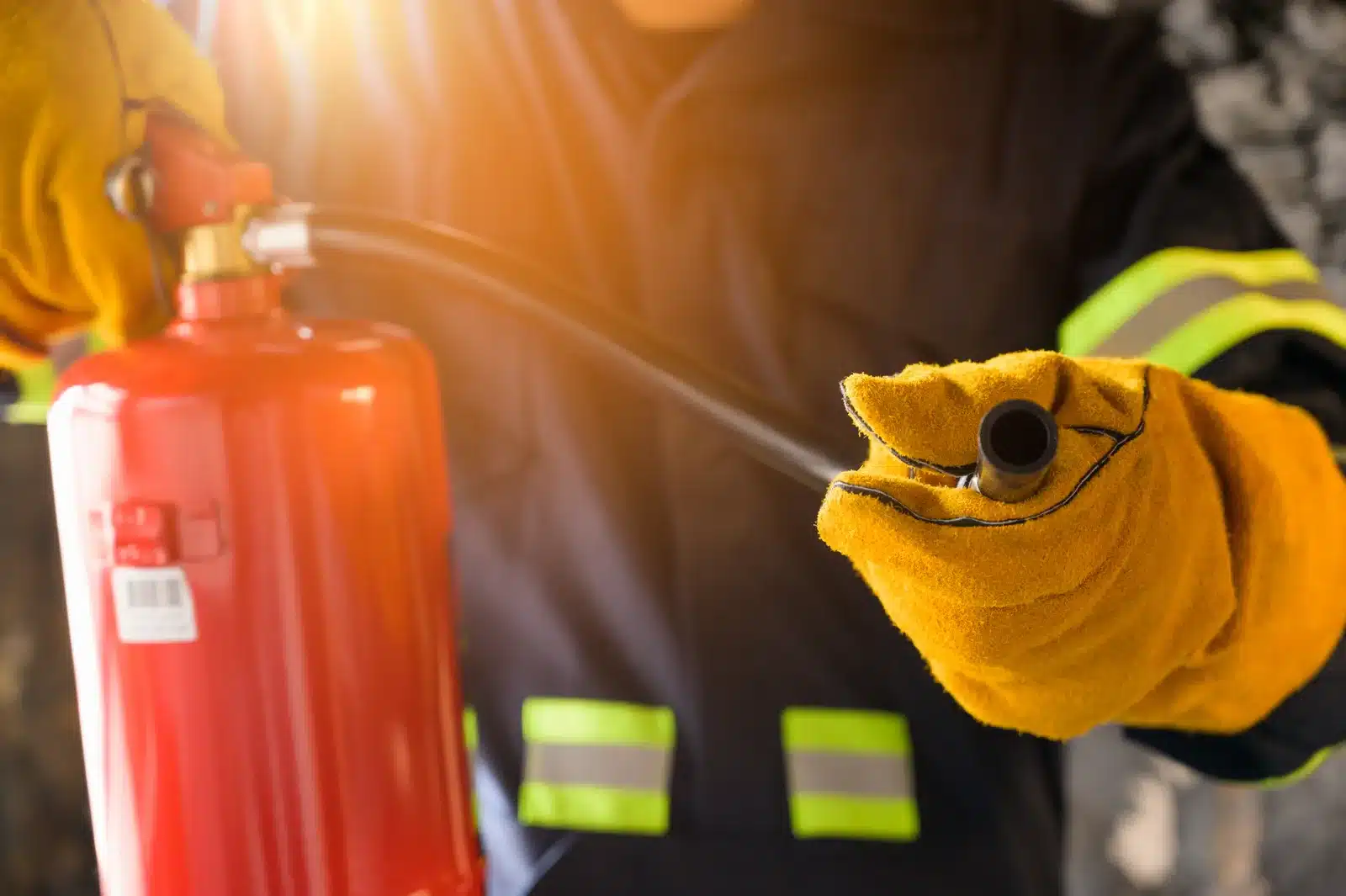Is AFFF Still Used Today?
In recent years, the use of aqueous film-forming foam (AFFF) has come under intense legal scrutiny due to its environmental and health impacts, which are tied to exposure to harmful chemicals such as polyfluoroalkyl substances (PFAS). AFFF, a firefighting foam traditionally used for extinguishing flammable liquid fires, contains PFAS, which are linked to significant health risks, including certain cancers, reproductive impairment, immune system disruption, and other serious conditions that impact human health. As legal advocates for environmental justice and public health, RTRLAW examines the current regulatory landscape surrounding AFFF use and its legal implications for both firefighters and affected communities.
AFFF has been a critical tool utilized by firefighters and fire departments, particularly in military installations, aviation facilities, and industrial settings, since its development in the 1960s to combat jet fuel fires. AFFF has proven highly effective in quickly suppressing flammable liquid fires. However, it contains toxic chemicals often referred to as “forever chemicals,” which persist in the environment and the human body, leading to significant health and ecological risks that form the basis of ongoing litigation. The number of U.S. states that banned or severely limited AFFF increased from just a handful to at least 15 in 2021. Studies have linked PFAS exposure to a range of health issues, including cancer, immune system effects, and hormonal disruptions, creating substantial legal liability for responsible parties.
What Is the Current Use of Aqueous Film Forming Foam (AFFF)?
Despite growing legal awareness of its dangers, AFFF remains in use today under increasingly restrictive circumstances. The military and some civilian firefighting units continue to use AFFF for its unparalleled firefighting capabilities, especially in scenarios where rapid response to fuel fires is critical. AFFF is still allowed for emergencies and actual fires that require its use until an alternative is found. However, there is a strong regulatory and legal push toward phasing out PFAS-containing AFFF and other fluorinated foam products through federal legislation and state-level regulatory measures, with increased attention to managing foam releases during testing, disposal, or use. AFFF is currently being phased out, with a complete ban scheduled in some regions by July 2025.
The Environmental Protection Agency (EPA) has established comprehensive regulations for the safe disposal of PFAS-containing AFFF and other fluorinated foam firefighting foams, while multiple states have enacted laws to restrict usage and address releases. Additionally, the National Defense Authorization Act has set forth mandatory requirements for the Department of Defense to phase out the use of PFAS-based firefighting foams by 2024, signaling a significant legal shift away from AFFF in military operations and creating precedent for civilian applications. In 2024, the EPA also designated PFOA and PFOS as “hazardous substances” under the Superfund Act (CERCLA), further emphasizing the legal and environmental urgency to address these chemicals.
What States Have Banned the Use of AFFF?
In response to mounting legal pressure and growing concerns over the environmental and health risks posed by AFFF—including the risk of contaminated water resulting from foam discharge—several states have taken decisive legislative action to restrict or ban its use, which impacts fire departments across their regions. These measures reflect a legal commitment to protecting public health and the environment from the harmful effects of toxic chemicals and PFAS compounds that can contaminate drinking water and be released into the environment through the use of AFFF. As of the latest regulatory updates, the following states have implemented comprehensive legal frameworks to curb the use of AFFF:
- California: California has introduced strict legal restrictions on the use of PFAS-containing AFFF, established liability frameworks, and promoted the mandatory adoption of safer firefighting alternatives through state legislation.
- New York: New York has enacted comprehensive legislation banning the sale and use of PFAS-containing AFFF, leading the legal charge in environmental protection and establishing precedent for PFAS-related litigation nationwide.
- Washington: Washington State legally banned the use of PFAS-containing firefighting foams in most applications, with limited exceptions only for certain critical uses where alternatives are not legally viable, creating clear regulatory guidelines. In 2018, Washington passed the Toxics in Firefighting law, which restricts the use of AFFF for fire training.
- Michigan: Michigan has taken legal steps to restrict the use of AFFF in fire training exercises and has implemented comprehensive measures for the safe disposal of PFAS-containing foams, establishing liability standards for contamination.
More than two dozen U.S. states have passed laws to restrict AFFF, including prohibiting discharge for training purposes and banning sales of PFAS-containing AFFF.
These states represent the legal forefront of a growing movement to eliminate the use of hazardous firefighting foams across the United States, including in military applications. By enacting these bans, fire departments are setting legal precedent for other states to follow, encouraging the mandatory transition to safer, PFAS-free firefighting alternatives and creating the foundation for future litigation.
RTRLAW recognizes the critical importance of these legislative actions and supports the legal push toward eliminating the use of harmful AFFFs. Our firm is committed to keeping our clients informed about the evolving legal landscape surrounding AFFF regulations and advocating for the health and environmental safety of communities affected by PFAS exposure through comprehensive legal representation.
What Are the Challenges That Come with Banning AFFF?
The legal transition away from AFFF presents significant regulatory and liability challenges, as finding alternatives that match AFFF’s effectiveness for suppressing fires involving flammable liquids without creating additional legal exposure is a complex undertaking. However, substantial progress is being made in developing fluorine-free concentrates and adopting new foam products that meet both performance and legal safety standards. Military bases and facilities worldwide—including airports, oil and gas sites, and industrial complexes—are undergoing major changes to replace outdated foam systems, with a key compliance deadline set for October 2024. Firefighters play a critical role in this transition, adapting to new foams and participating in updated fire training protocols. The Federal Aviation Administration (FAA) has approved fluorine-free alternatives for airport firefighting, while fire departments are implementing new training programs and exploring advanced technologies, including foam testing and monitoring equipment to ensure legal compliance. Additionally, Compressed Air Foam Systems (CAFS) have emerged as an innovative solution, utilizing a mixture of water, foam concentrate, and compressed air to create effective foam for fire extinguishing.
Alternatives to AFFF
As the world moves away from Aqueous Film Forming Foam (AFFF) due to its association with PFAS and resulting health and environmental risks, the search for effective alternatives to combat flammable liquid fires has become a top priority for fire departments, military installations, and regulatory agencies. One of the most promising solutions is the adoption of Fluorine-Free Foam (F3), a type of firefighting foam that offers a safer and more sustainable approach to combating flames. Fluorine-free foams (F3) are direct replacements for AFFF and are effective on Class B fires without harmful PFAS chemicals. Numerous fluorine-free foams (F3) are available as replacements for AFFF and are the standard for Class B fires, undergoing testing by organizations like the U.S. Department of Defense. Another alternative gaining traction is water mist systems, which use very fine water droplets to cool and extinguish fires without the need for chemicals, offering a clean and environmentally friendly firefighting method.
Fluorine-free foams are specifically designed to suppress flammable liquid fires without the use of PFAS, often referred to as “forever chemicals.” These foams work by creating a stable aqueous film over the fuel surface, effectively cutting off the oxygen supply and preventing the release of flammable vapors. Unlike AFFF, fluorine-free firefighting foams do not persist in the environment or accumulate in the human body, significantly reducing the risk of PFAS exposure and contamination of drinking water. Synthetic F3 foams, such as GreenFire Firefighting Foam (GFFF), are non-hazardous and rated for Class B flammable liquid fires.
The transition to fluorine-free firefighting foams has been accelerated by legislative measures such as the National Defense Authorization Act, which mandates the Department of Defense to phase out PFAS-containing firefighting foams. In response, the DoD and other defense organizations have invested in the development of new formulations that meet strict military specification (mil spec) standards. These efforts have led to the introduction of high-performance fluorine-free foams that can serve as a drop-in replacement for AFFF in many applications.
However, the shift to fluorine-free alternatives is not without its challenges. The Federal Aviation Administration (FAA) maintains rigorous requirements for firefighting foam performance at airports, and new fluorine-free foams must demonstrate equivalent or superior effectiveness in suppressing jet fuel fires and other flammable liquid incidents. Additionally, fire departments must adapt to new fire training protocols and, in some cases, modify existing equipment to ensure compatibility with these new foams. Testing shows that fluorine-free foams often require more product and more time to extinguish fires compared to AFFF.
Despite these hurdles, the benefits of transitioning to fluorine-free firefighting foams are clear. They offer enhanced safety for firefighters and the public, reduce the risk of environmental contamination, and align with the Environmental Protection Agency’s (EPA) regulations and guidance on minimizing hazardous substances in firefighting operations. The EPA has provided resources and support to facilitate the adoption of these alternatives, recognizing their critical role in protecting human health and the environment from harmful compounds.
In recent years, the market for fluorine-free foams has expanded rapidly, with manufacturers introducing innovative products that meet or exceed the performance of traditional AFFF. The defense sector, along with firefighting departments worldwide, is leading the charge in adopting these new solutions, ensuring that the transition away from PFAS-containing foams is both effective and sustainable. In addition to foam alternatives, engineered solutions like containment floors, such as Safespill, are being implemented. These floors are designed to drain and remove fuel spills before ignition, effectively negating the need for foam in certain scenarios and further reducing environmental risks.
RTRLAW’s Stance and Support
RTRLAW is at the forefront of advocating for the rights of individuals and communities affected by AFFF exposure. Our firm supports comprehensive legal efforts to regulate and eventually eliminate the use of PFAS-containing firefighting foams through litigation and legislative advocacy, leveraging various resources to achieve this goal. We are dedicated to raising awareness about the risks associated with AFFF and providing expert legal assistance to those who have suffered health consequences due to PFAS exposure and other harmful chemicals.
If you or a loved one has been exposed to AFFF and is experiencing health issues, RTRLAW urges you to seek immediate medical advice and legal support. Our experienced environmental and personal injury attorneys are committed to fighting for the compensation and justice you deserve, while holding responsible parties accountable for the release of hazardous substances and the resulting contamination of drinking water and soil.
Although AFFF is still used in limited circumstances, significant legal and regulatory steps are being taken to reduce its usage and mitigate its impacts through comprehensive legislation and enforcement actions. RTRLAW remains vigilant in monitoring legal developments related to AFFF regulations and is here to provide legal support to affected individuals and communities as they navigate the complex landscape of environmental and health law. Meanwhile, the European Chemicals Agency has proposed a widespread ban on the manufacture, use, and export of AFFF within the European Union, reflecting a global shift toward eliminating these harmful substances.


 CALL US NOW
CALL US NOW TEXT US NOW
TEXT US NOW



























